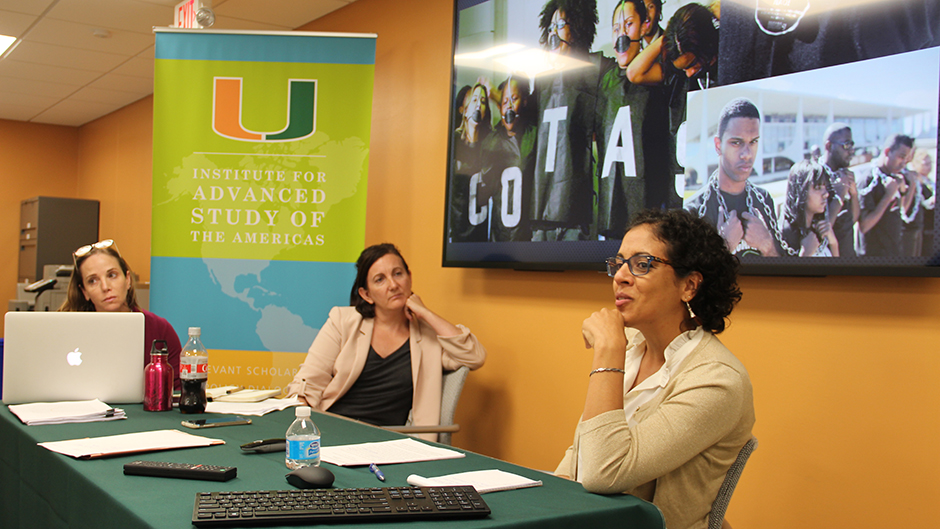A cadre of 10 lecturers, half from the University of Miami, shared their particular research and insights at the Language and Democracy Symposium on May 4, a full-day event co-sponsored by the University’s School of Law, Latin American Studies Program, and Department of Philosophy. The symposium was held at UM’s Institute for Advanced Study of the Americas and funded principally by an Interdisciplinary Research Group faculty grant.
Otávio Bueno, chair and professor of the Philosophy Department, Tracy Devine Guzmán, associate professor of Latin American Studies, and Kunal Parker, professor of law, convened the symposium to explore existing and possible relationships between the concept and lived experience of linguistic pluralism and the impact of that diversity on both ideas about and practices of democracy.
“Each of these disciplines cuts across democracy and language in different ways, and with the symposium we’re seeking to illuminate the issues to better understand the challenges that democracy faces,” Bueno said. “The topics now are even more important. We have minorities—many who don’t speak English—being disrespected and mistreated. This brings serious challenges to contemporary American democracy.”
Lecturers across diverse disciplines used a range of vehicles—historical, literary, scientific, and legal, among others—to explore the theme of the symposium, the outgrowth of a cross-disciplinary working group that met regularly for several years and a previous conference of the same name held in March 2013.
A panel on “Language, Democracy and (Social) Justice” served to generate consensus that minority populations, whether defined ethnically, linguistically or racially, are powerfully—and at times tragically—impacted by how language and democracy collide.
“It came to the fore that these peoples’ well-being is on the line and that their experience is specifically derived from their status as minorities,” said Devine Guzmán. “That (understanding) brings this broad topic down to earth about how minorities are served by bringing linguistic consideration into the conversation about democracy and representation.”
Isadora Mota, an assistant professor of history who presented on "Slave Literacy and Black Abolitionism in 19th-Century Brazil," linked the slave populations’ struggle for literacy and access to education at the turn of the 19th century to Brazil’s current grassroots movement to expand affirmative action programs that benefit historically underserved populations.
English associate professor Brenna Munro shared examples of innovative contemporary literary uses of technologized language in Nigeria, where more than 500 different languages are spoken, the urban lingua franca is Pidgin, and most published literature is in standard English.
Munro’s examples depicted characters that, through their digitized linguistic expression, appeared to be fragmented, fractured or “disembodied.”
“I’m not sure how much a democracy can exist dependent on people divorced from real forms of self,” Munro offered in her conclusion.
In his presentation, “Sciences, Pluralism, and Democracy,” Bueno explored whether the sciences and democracy embody the same values—or if they should. He advanced the notion that the study of science—similar to democracy—follows no set comprehensive set of rules or practices.
“You try to gather results in whatever way you can,” Bueno said. “There are no overarching coherent theories or practice and not even the aims of the enterprise of science are consistent—and, in fact, theories are sometimes contested and in opposition with each other.”
Devine Guzmán suggested that the symposium might serve to produce a collectively authored document to help inform ongoing conversations about the crossroad of linguistic diversity and democratic goverance.

